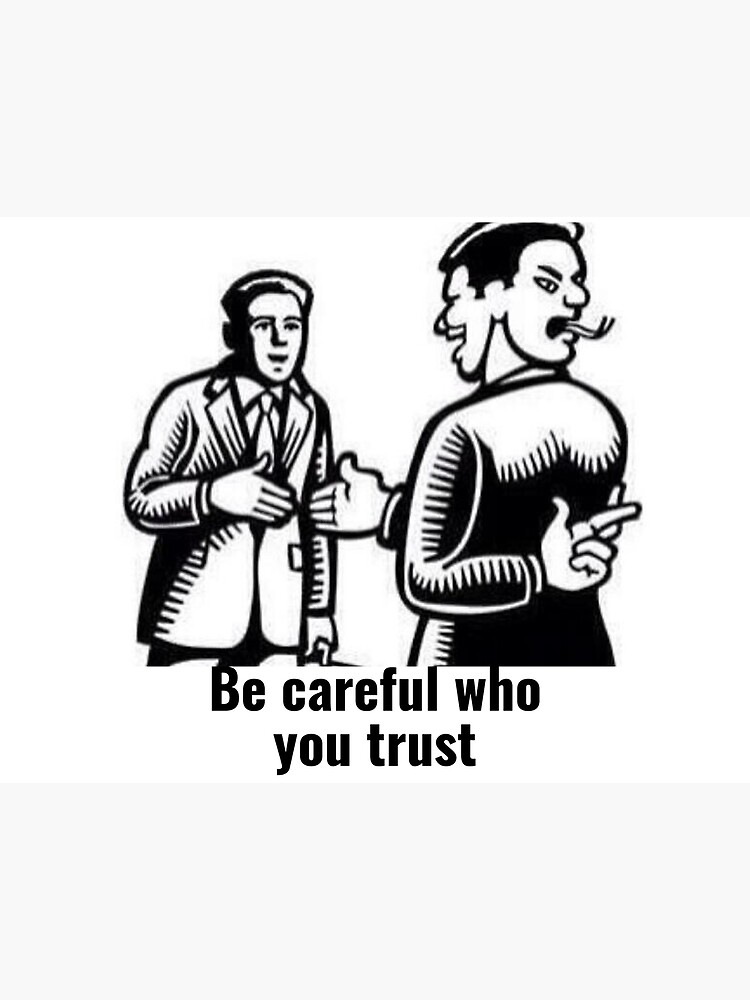Introduction
Trust is a fundamental aspect of human interaction. From personal relationships to business partnerships, trust forms the foundation upon which we build connections. However, not everyone is deserving of our trust, and blindly placing it in the wrong hands can lead to dire consequences. In this comprehensive guide, we delve deep into the importance of being cautious about who you trust. We will explore strategies to make informed decisions, avoid pitfalls, and build trustworthiness in your relationships.
Be Careful Who You Trust
Trust is like a delicate glass sculpture; once it’s broken, it’s challenging to restore its original form. So, let’s begin by understanding why it’s crucial to be cautious about who you trust.
The Fragility of Trust
Trust, once shattered, is challenging to rebuild. It’s like Humphrey Dumpy; once it falls, all the king’s horses and all the king’s men can’t put it together again. When you trust someone, you invest in their integrity and reliability. If they betray that trust, it can have far-reaching consequences in various aspects of your life, be it personal or professional.
The Impact on Personal Relationships
In personal relationships, trust forms the bedrock of love, friendship, and family bonds. When trust is eroded, it can lead to broken hearts, severed friendships, and fractured families. So, it’s essential to be discerning about who you allow into your inner circle.
The Consequences in Business
In the business world, trust is the currency of success. Trustworthy partnerships lead to fruitful collaborations, while misplaced trust can result in financial losses and damaged reputations. Entrepreneurs and business leaders must exercise caution when choosing their allies.

How to Determine Trustworthiness
Now that we understand the significance of being careful about who we trust let’s explore practical strategies to assess someone’s trustworthiness.
Assessing Character
Observe Consistency
People who are trustworthy exhibit consistency in their words and actions. They don’t make promises they can’t keep and follow through on their commitments. Be wary of individuals who frequently change their tune or break their promises.
Evaluate Honesty
Honesty is the cornerstone of trust. Pay attention to how someone handles the truth. Are they open and transparent, or do they evade questions and provide half-truths? Trustworthy individuals value honesty above all else.
Analysing Intentions
Understand Motives
Take the time to understand the motives of the person you’re considering trusting. Are their actions driven by self-interest, or do they genuinely have your best interests at heart? Trust should be based on mutual benefit, not exploitation.
Assess Reliability
Reliable individuals do what they say they will, consistently. Evaluate whether the person in question meets their commitments without excuses or delays. Reliability is a key indicator of trustworthiness.
The Red Flags of Untrustworthy
To avoid falling into trust traps, it’s crucial to recognise the red flags of trustworthiness.
Inconsistencies in Behaviour
If someone’s actions don’t align with their words, it’s a warning sign. Inconsistencies suggest a lack of integrity and can erode trust.
Frequent Deception
Deception, whether through lies or omissions, is a clear sign of trustworthiness. Be cautious when dealing with individuals who are not forthright.
Unwillingness to Take Responsibility
People who refuse to take responsibility for their actions cannot be trusted. Trustworthy individuals own up to their mistakes and work to make amends.
Repeated Betrayals
If someone has a history of betraying trust, it’s unlikely they will change their ways. Be cautious about trusting individuals with a track record of betrayal.
FAQs (Frequently Asked Questions)
What should I do if I’ve been betrayed by someone I trusted?
Betrayal can be incredibly painful. It’s essential to prioritise self-care, seek support from trusted friends or professionals, and consider whether reconciliation or distancing is the best course of action for your well-being.
Is it possible to rebuild trust once it’s been broken?
Yes, but it takes time and effort from both parties involved. Rebuilding trust requires open communication, accountability, and a genuine commitment to change Careful.
Can technology help in assessing trustworthiness?
Technology can provide insights, such as background checks and online reviews, but it should complement, not replace, your judgement and intuition Careful.
How can I trust again after a significant betrayal?
Rebuilding trust in the aftermath of a betrayal is challenging but possible. Start by setting clear boundaries, seeking therapy if needed, and giving yourself time to heal.
Is it better to trust too much or too little?
Finding the right balance is key. Being overly trusting can lead to vulnerability, while excessive mistrust can hinder meaningful relationships. It’s essential to assess each situation individually.
What role does intuition play in trusting someone?
Intuition can be a valuable tool in assessing trustworthiness. Pay attention to your gut feelings and combine them with rational analysis for a well-rounded judgement.
Conclusion
In a world where trust is both a currency and a commodity, it’s vital to be discerning about who you trust. Blind trust can lead to heartache and disappointment, but cautious trust can foster meaningful, lasting relationships. Remember, trust should be earned, not freely given. By assessing character, intentions, and recognising red flags, you can navigate the complex landscape of trust with confidence. So, be careful who you trust, and let your intuition guide you towards genuine connections.



